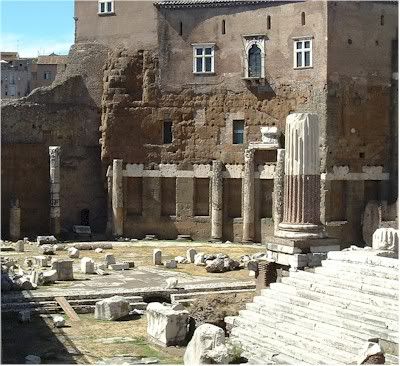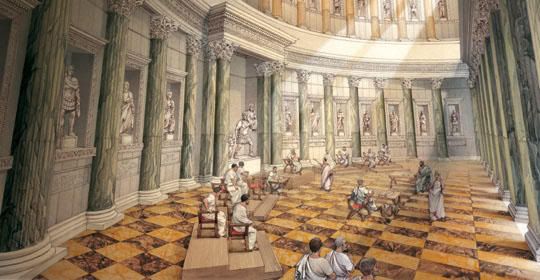
To celebrate my students' efforts, and to entice others to try the practomimetic method, I want to start highlighting some of the incredible things students in these courses are doing. The students of FABULA AMORIS ROMANI are now on their way North from Rome towards two neighboring farms in the Sabine Hills: one is the famous farm of Horace, given him by Maecenas; the other is the farm of the Recentii, the gens of my students' Romans.
Along with them go their wicked uncle Gaius, and the future emperor Tiberius, whom I call Drusillus (an unattested but plausible nickname), and a disreputable poet named Naso (that's Ovid's real name, from one perspective, and indeed the name by which he has frequently been known through history; it means "nose," so it also has the benefit of just being kinda funny). They've been sent on this sojourn by none other than Augustus the princeps himself, after having performed for him his favorite song, Horace's Carmen Saeculare, with which a chorus of boys and girls had celebrated Augustus' New Age of peace 25 years before. My students' Romans performed the song as a chorus in the portico of Aeneas in the Forum of Augustus, as Augustus himself took a regal position next to the life-size statue of his "ancestor."

Earlier, when they had first entered the Forum, the student who goes by the Roman name Portia had practomimed thus:
Portia, fearing that all these extravagant plans for creating commotion might fail--i.e. anger the Princeps instead of gain an audience with him--decides to create an Augustus-pacifying back-up plan. 1d10=9 (9)And, that the dramatic element not be excluded, here's what the student cui est Romulus nomen did in hopes of entering the forum:
After the group has re-emerged from the dark alley with the litter and continued on its way on the Via dei toward the Forum pincipis, she slips away for a moment to Julius Caesar's temple of Venus Genetrix. There she pauses to admire the apse and eight splendid columns [from the source, I cannot quite tell whether these were Trajan's creation or whether they existed in Caesar's construction, storing up details its construction and the impression they gave in her memory. If Augustus cannot be distracted by more flamboyant means, she might be able to compliment him on the beauty and inspirational qualities of his father's temple, which could even lead to allusions about the connection between the temple's patroness and the temple's builder. Then stories of any of the three illustrious figures (Venus, Caesar, or Augustus), or at least didactic advice for young Romans, might ensue, if the Princeps should feel loquacious, and his narration would not likely prove short. By the time he has finished, perhaps he will have forgotten to punish the malefactors for bringing commotion into his forum--or at least he might be slightly more willing to mitigate the punishment.
Source about the temple:
Orlindo Grossi, "The Forum of Julius Caesar and the Temple of Venus Genetrix" (JSTOR)
Romulus is feeling a bit confused about the plan to meet the princeps, but he decides to try a radical plan. He notices a group of slaves standing around a litter that looks particularly fanciful and ornate. Being a country rube, Romulus has never seen such a thing.
"What's that?" he asks the slave.
"It's called a litter," says one of the slave. "Rich people use them to ride around the city so they don't step in all the sewage. It's our job to carry it."
"Who does this belong to?" Romulus asks.
"It belongs to the princeps himself," says the slave, somewhat proudly. "We're bringing it to pick him up at the forum principis. Well, I'd better get going now."
"Wait," says Romulus, putting an arm around the man's shoulders. "Come talk to me in this dark alley for a second." Once they are inside the alley, away from the profanus vulgus, Romulus draws his gladius and charges at the slave with murder in mind. 1d10=9 (9)
Romulus stabs the slave 9 times and the man falls to the ground, quite dead. Romulus strips off the man's livery (or whatever the Roman equivalent was) and quickly puts it on. Then he steps back out on to the street. Along with the other slaves of the princeps, Romulus picks up his side of the litter and begins walking towards the forum principis. Disguised as the princeps's litter bearer, he should have no trouble getting close to him.
For enrichment: http://www.vroma.org/images/mcmanus_images/litter.jpg
It has also become clear that Augustus has plans for Naso that Naso hadn't known about. Ovid, clearly being a poet who prides himself above all on his cleverness, had, it seems, placed much too much faith in the princeps' obtuseness. It now appears that the princeps knows about what Ovid has been up to. I don't want to spoil the story, but if you're reading this post, you probably know how it ends. . . . Obviously the signal benefit of the practomime is that my students and I get to experience it for ourselves in such a way that we may be able to understand the poetry surrounding the event in a deeper way.
That then is the narrative context in which we find one of my favorite exasperating students, whose Roman is named Fabius, formulating the following:
Fabius has not a multitude of things to say about paved roads, but he recalls something very specific about roads and the end of the third servile war...but since he feels like it at the moment, Fabius reasons, he shall first talk a little more about Russell Crowe.....Will they reach the farms before Naso's fate finds him? Can we find a way to make that fate less, or perhaps more, than tragic?
From his youth to the present, Crowe has had a special love of horses. "They're just like people," he told CraveOnline. But how does this relate back to paved roads? An excellent question, for, well, it doesn't. But Crowe's critically acclaimed film Gladiator is much based on the events of the rebellion led by Spartacus in 73 b.c....a rebellion also known as the last of the servile wars...Fabius recalls that his father's father ('s father, possibly) witnessed the brutality with which the defeated slaves under Spartacus were treated after the war...all six thousand prisoners were crucified along the Appian way from Rome to Capua...Fabius thinks it'd be totally intimidating if one had to walk along a road lined up full of rotting corpses..."But surely the corpses have been taken down by now...well if not they're definitely skeletons"



